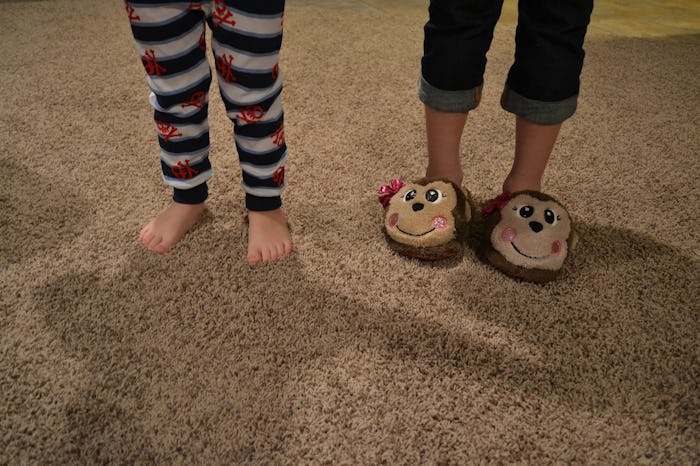During a recent recital at my son's school, a few friends and I were reminiscing about the days when our rambunctious kids were just babies. Though there were a number of good memories, none of us missed the sleeplessness that came along with early parenthood. Even with children who are school-aged, however, the consensus is that bedtime can still be a battle. It seems babies and big kids have the tendency to resist a regular sleep routine. If slumber is still a struggle in your house, it helps to know the myths about getting kids to sleep, so that you can decipher between what's fact and fiction.
Most parenting topics can become overwhelming when you have family, friends, and complete strangers all offering their unsolicited, but well-intentioned, advice. Though there's no such thing as a BS detector (yet), it certainly would be nice if there was a way to sift through the intimidating amount of information floating around out there. That's why it can be a huge relief and time-saver to be able to know what bedtime theories are nonsense. So if you're tired, figuratively and literally, of the guessing game, check out these myths about getting kids to sleep that are BS.
Myth #1: Silence Is Essential
Although you've probably shushed someone for fear of waking your child, it's a myth that you have to be in super stealth mode all the time. As pediatrician Dr. Laura E. Tomaselli told Parents, children can fall asleep in noisy environments. In fact, if they get used to hearing certain household sounds from a young age, then they'll likely be solid sleepers throughout life. That means you don't have to worry about tiptoeing around the house at night.
Myth #2: They'll Tire Out
I'll be the first to admit that I've encouraged a bit of extra playtime in the hopes of wearing my son out for an easy bedtime. But, according to The Baby Sleep Site, "over-tiredness actually causes difficulty falling asleep and increased waking in the early morning hours." Basically, there really is such a thing as making your kid too tired to sleep.
Myth #3: Don't Coddle
Rocking your little one to sleep seems to be frowned upon from infancy through childhood. But as sleep expert Sarah Ockwell-Smith told HuffPost, a general rule is that any movement that soothes your child to sleep isn't going to have any negative effects. If a little cuddling seems to do the trick, then don't let anyone try to dissuade you from it.
Myth #4: Push Bedtime Further
Some people will tell you that setting a later sleep schedule will let you bypass any arguments over going to bed. But, as pediatrician Dr. Tanya Remer Altmann told The Bump, putting your child to bet half an hour earlier than usual is more likely to get them to fall asleep. As much as your kids may try to convince you that later is better, this myth is busted.
Myth #5: Skip Naps
A common myth about children and sleep is that forgoing naps will make going to bed at night easier. According to Tulsa Pediatric Sleep Consulting, skipping naps can disrupt a child's sleep pattern and actually make bedtime more difficult. It's good to remember that every kid is different and outgrows napping at their own pace.
Myth #6: Don't Indulge In Late Snacks
Getting a case of the midnight munchies isn't just an adult thing. As Ockwell-Smith told HuffPost in the aforementioned article, it's normal for children to be hungry at night. Since your little one is still growing, ensuring their belly is full before bed isn't a bad idea at all.
Myth #7: They Can Catch Up On The Weekend
If you go into debt, you can bring your bank account into the positive by making a deposit. The same concept doesn't work for sleep, though. According to the Sleep Health Foundation (SHF), using the weekend for sleeping in to make up for lost sleep won't make going to bed easier. Maintaining a consistent routine is a better option than playing catch-up when it comes to keeping your child well-rested.
Myth #8: You Have To Set Universal Schedules
In a perfect world, your whole family would abide by the same sleep schedule. According to the Baby Sleep Site, however, setting strict bedtimes won't make siblings share the same sleep habits since each child has their own temperament. Just because your older child was a morning person doesn't mean your youngest won't be a night owl.
